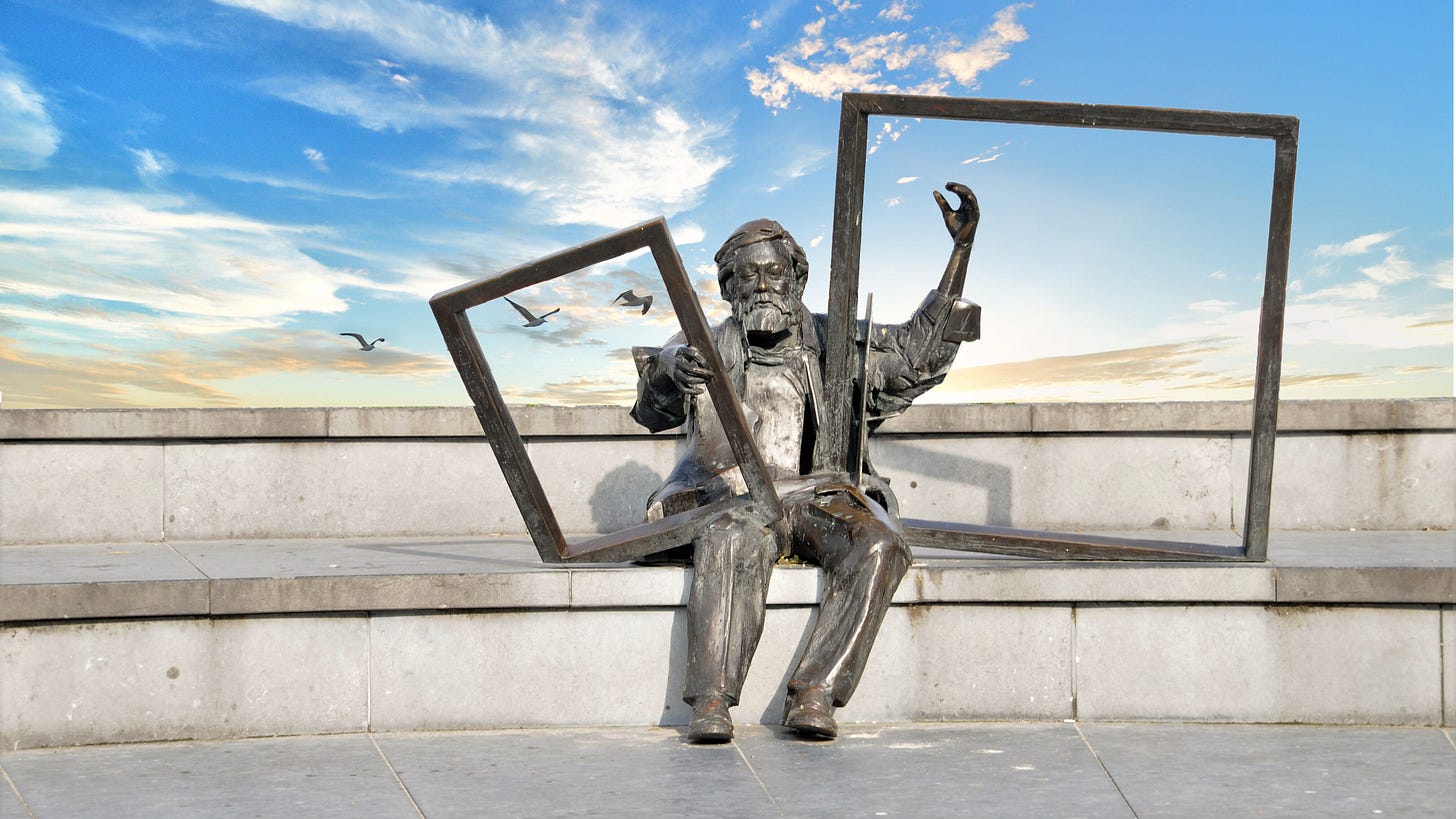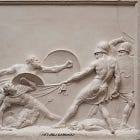“The evil we do doesn’t attract to us as much persecution and hatred as our good qualities.”
— La Rochefoucauld, Sentences and Moral Maxims
Socrates, Giordano Bruno, and Gandhi dared to believe something and put it into practice.
Let’s just say it didn’t work out for them.
It’s not just rebels threatening powerful people who are squashed. We can explain away the deaths of Hypatia of Alexandria or Bruno this way, but the problem is far more expansive.
The real issue is that the mob hates excellence and morality whenever it’s an indictment or a rebuke, which it often is.
A great example is a series of studies on the “rejection” of moral rebels.
Those induced to make speeches they didn’t agree with disliked people refusing to give the speech on principle.
Those induced to discriminate against African Americans in hiring disliked those rebelling against this injustice.
“…rebels are resented when their implicit reproach threatens the positive self-image of individuals who did not rebel,” the researchers wrote.
Further investigation narrowed down what’s resented. Rebels are hated along at least two vectors: Having principles ranked higher than the group’s will, and for expressing that principle through rebellion.
And as for the rebels themselves? It appears they’re able to buck society because they have moral mentors and better “moral trait integration”. They…
Consider moral values (virtue) as core parts of who they are.
Try to live their values.
Experience less internal conflict over prioritizing their principles.
Are less likely to compartmentalize away life decisions that don’t align with their morality.
Why Everyone Hates Vegans:
It’s no surprise that people hate vegans. Whereas only those “going along with” discrimination might hate those who refuse, virtually everyone eats animal products and has reason to hate those whose abstention seems like condemnation.
A 2015 study examined attitudes toward people facing public hostility and found gay people, immigrants, atheists, and black people face less discrimination than vegetarians and vegans. Only drug addicts are hated more.
Meat eaters face painful cognitive dissonance if their diet conflicts with their moral beliefs or personal image.
“I don’t like to hurt animals, but I buy factory-farmed meat.”
“Compassionate people don’t hurt animals, but I buy factory-farmed meat.”
When awareness of this conflict is forced on them, people implement dissonance-reducing strategies to escape the sting. Hating or mocking vegetarians is one option, as is justifying the choice or compartmentalizing.
There appear to be several “off-ramps” vegans can embrace to escape the fate of despised moral rebels. Namely, they can shut up and not voice their moral thoughts or campaign for animals. Or they can claim their diet is for health reasons.
Of course, for a true moral rebel with principles and a will to stand up for them, this will be unacceptable.
Repellant Excellence:
"Virtuti inimica invidia est."
"Envy is hostile to virtue."
— Publius Syrus, Moral Sayings
One of the unexpected downsides of all excellence is a loss of influence, which I find hard to wrap my head around.
We’re used to praising excellence as “inspiring,” but when it causes someone to fear devaluation or rebuke, they stay away from the person embodying it.
A series of studies on fit doctors of overweight patients found “individuals who are overweight or obese and concerned about their weight avoid physicians who advertise their fitness, for fear that these doctors will judge them negatively.”
It’s a damned if you do damned if you don’t conundrum.
Doctors who smoke are less knowledgeable about the dangers of smoking and less likely to counsel patients to quit. But if they don’t smoke, their abstinence might well seem like a rebuke to the smokers.
Similarly, doctors who don’t exercise are less likely to tell patients to do it. But if they do exercise…you get the idea.
The Excellent Truth Hurts:
The funny thing about the truth is that it’s both empowering and painful.
Science has great news for us!
Only 10% of the risk of most cancers is genetic. In fact, only a small amount of all disease risk is genetic. Most of our risk is diet and lifestyle. But if you tell this to a cancer patient or someone who just lost a family member, it sounds like an indictment.
So doctors try for tact, but the truth will always sting, and there’s no way out. Do you withhold that the ball’s mostly in their court and risk dereliction of duty? You either doom them to more of the same through omission, or you hurt them with reality.
Medical journals counsel doctors that it’s better to ask patients about their own goals rather than telling them what science suggests would improve their health.
This undoubtedly reduces feelings of judgement, but there’s a clear problem — most people are deluded about their health status and what causes health.
Only 1 in 500 children eat enough fruits and vegetables, but the overwhelming majority of surveyed parents think their children have great diets.
94% of parents with obese children think their children are of normal weight or only a little overweight.
Most overweight parents of overweight children think neither they nor their children are overweight.
Maybe doctors should let adults make their own decisions and stay silent, but should they say nothing as adults doom their children to a less healthy future? The right choice here is less clear.
Overcoming Anti-Excellence Bias
One way to make excellence more palatable is to emphasize that it’s not about innate traits, but learning, effort, repetition, and growth. Carol Dweck writes about this “growth mindset’ in her book, Mindset.
But undoubtedly, this will be a slow and much-opposed mindset shift for many. People love to believe in their impotence. It’s easier to swallow than personal responsibility.
If you’re committed to excellence, you’ll probably eventually conclude that trying to bring the world up to speed is a fool’s errand. Those shining brightly attract snipers. So what should you do?
First, acceptance. You’ll drive yourself mad with any other approach.
A good starting point is remembering to embrace hypocrites who at least voice the higher ideal, even if they can’t live up to it, since those who listen to them will.
But we should acknowledge that stubborn excellence and the rebukes baked into it might well cost us. Socrates decided he would stake out his position and let the cards fall where they may, which cost him his life.
I talk about why I still think he’s a great model for us in this article.
In the end, we should ask ourselves: how far are we willing to go for our ideals?
The ancient Stoics gave us their answer — always choose virtue. But they’d also remind us, that choice has a price.
Thanks for reading Socratic State of Mind.
If you liked this article, please like and share it, which helps more readers find my work.







I like your essay and found compelling the idea that people turn against ethically driven actors because those actors are a threat to their own self image. That makes a lot of sense.
The supposition, however, that “everyone” hates vegans doesn’t ring true. Some people undoubtedly hate vegans, and their contempt may well be driven by the factors that you sight, but these people are in the minority in my experience. I’m not a vegan nor a vegetarian, neither are most of my friends. Some of my friends are, however, and I can’t recall a conversation where this was held against them.
I do make an effort to eat less meat, avoid plastics, go on foot instead of driving, … but I don’t practice any of these habits as thoroughly as those who are more committed and disciplined than I. Yet, I don’t hold this against them. I also don’t find them to be preachy or acting as if they’re superior in some way, even if they occasionally remind me of their virtues.
The vegans I know are very sensitive and caring people.
Overall a great essay and absolutely true.
I would critique that Vegans are probably a bad example because I dislike them for two main reasons
1. They're obnoxious moralizers with binary thinking who follow the trope "how do you know the vegan at the party? They'll tell you."
2. They don't understand the science that they trade one death for thousands of deaths as no plant matter farming is animal death free as the carrion birds flocking after my uncle's soybean combines can attest.
Along the same lines are Road cyclists and Crossfitters. It's late and parcel to a religious projection of holier than thou. People despise that.
People hate those who do live a life that holds a mirror up to their inadequacies. This is why people shake their heads and scoff at 'woke and antiracism' but hated the civil rights movement. It's a subtle but important distinction that woke and vegan and others haven't figured out. They're not Ghandi or the Apostle Stephan, they're Nancy, the pearl clutching moralizer.